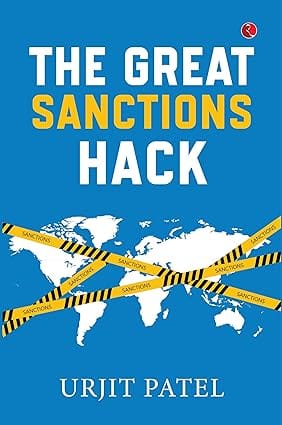WELCOME TO MIDLAND BOOK SHOP!
SHOP FOR
- Non-ficton
- Non-ficton
- Contemporary Fiction
- Contemporary Fiction
- Children
- Children
- Comics & Graphic Novels
- Comics & Graphic Novels
- Non-Fiction
- Non-Fiction
- Fiction
- Fiction
Shop No.20, Aurobindo Palace Market, Hauz Khas, Near Church +91 9818282497 | 011 26867121 110016 New Delhi IN
Midland The Book Shop ™
Shop No.20, Aurobindo Palace Market, Hauz Khas, Near Church +91 9818282497 | 011 26867121 New Delhi, IN
+919871604786 https://www.midlandbookshop.com/s/607fe93d7eafcac1f2c73ea4/677cda367903fd013d69b606/without-tag-line-480x480.png" [email protected]9789370032613 6905f7ae3f72a2e4b68f3fee The Great Sanctions Hack https://www.midlandbookshop.com/s/607fe93d7eafcac1f2c73ea4/6905f7af3f72a2e4b68f4011/71r7qvxhgnl-_sy425_.jpg 9789370032613
In the 21st century, economic sanctions have become a widely used tool to control geopolitics, with the United States being the largest user of sanctions globally, followed by the European Union. Yet, mounting evidence shows that these measures often fall short of achieving their intended diplomatic outcomes. While sanctions are meant to pressure governments by targeting their economies, the actual impact tends to be slow, complex, and frequently ineffective.
In The Great Sanctions Hack, Urjit Patel, former Governor of the Reserve Bank of India, who now serves as Chairman of the National Institute of Public Finance and Policy, evaluates why the concept of sanctions needs a major overhaul. Their broader effects on global markets and unintended consequences for third parties must be considered. Economic damage unfolds gradually, not instantly, and should be tracked in more detailed stages. Moreover, the real cost to individuals, businesses, and global stability needs clearer and more transparent measurement.
Concerns are also rising about the role of international institutions that often fail to fairly assess the consequences of sanctions. This raises questions about their effectiveness in guiding international economic policy.
As global uncertainty grows, a more thoughtful, data-driven, and transparent approach to sanctions is urgently needed.
In The Great Sanctions Hack, Urjit Patel, former Governor of the Reserve Bank of India, who now serves as Chairman of the National Institute of Public Finance and Policy, evaluates why the concept of sanctions needs a major overhaul. Their broader effects on global markets and unintended consequences for third parties must be considered. Economic damage unfolds gradually, not instantly, and should be tracked in more detailed stages. Moreover, the real cost to individuals, businesses, and global stability needs clearer and more transparent measurement.
Concerns are also rising about the role of international institutions that often fail to fairly assess the consequences of sanctions. This raises questions about their effectiveness in guiding international economic policy.
As global uncertainty grows, a more thoughtful, data-driven, and transparent approach to sanctions is urgently needed.
About the Author
Urjit R. Patel served as the twenty-fourth governor of the Reserve Bank of India. During his tenure he was a director of the Bank for International Settlements and a member of the Advisory Board of the Financial Stability Institute.
Before his governorship, he was the Deputy Governor in charge of monetary policy and chaired a committee on strengthening monetary policy. From 2013 to 2018 he was principal/deputy in the G-2
Before his governorship, he was the Deputy Governor in charge of monetary policy and chaired a committee on strengthening monetary policy. From 2013 to 2018 he was principal/deputy in the G-2
in stockINR 396
1 1
Email ID already exists!
Your Current password is incorrect
Password Updated Successfully
Thanks for your Feedback
- Home
- Business and Management
- The Great Sanctions Hack
The Great Sanctions Hack
ISBN: 9789370032613
₹396
₹495 (20% OFF)SIZE GUIDE
Sold By: Hauz Khas - Aurobindo Market
Details
- ISBN: 9789370032613
- Author: Urjit Patel
- Publisher: Rupa
- Pages: 160
- Format: Hardback
Book Description
In the 21st century, economic sanctions have become a widely used tool to control geopolitics, with the United States being the largest user of sanctions globally, followed by the European Union. Yet, mounting evidence shows that these measures often fall short of achieving their intended diplomatic outcomes. While sanctions are meant to pressure governments by targeting their economies, the actual impact tends to be slow, complex, and frequently ineffective.
In The Great Sanctions Hack, Urjit Patel, former Governor of the Reserve Bank of India, who now serves as Chairman of the National Institute of Public Finance and Policy, evaluates why the concept of sanctions needs a major overhaul. Their broader effects on global markets and unintended consequences for third parties must be considered. Economic damage unfolds gradually, not instantly, and should be tracked in more detailed stages. Moreover, the real cost to individuals, businesses, and global stability needs clearer and more transparent measurement.
Concerns are also rising about the role of international institutions that often fail to fairly assess the consequences of sanctions. This raises questions about their effectiveness in guiding international economic policy.
As global uncertainty grows, a more thoughtful, data-driven, and transparent approach to sanctions is urgently needed.
In The Great Sanctions Hack, Urjit Patel, former Governor of the Reserve Bank of India, who now serves as Chairman of the National Institute of Public Finance and Policy, evaluates why the concept of sanctions needs a major overhaul. Their broader effects on global markets and unintended consequences for third parties must be considered. Economic damage unfolds gradually, not instantly, and should be tracked in more detailed stages. Moreover, the real cost to individuals, businesses, and global stability needs clearer and more transparent measurement.
Concerns are also rising about the role of international institutions that often fail to fairly assess the consequences of sanctions. This raises questions about their effectiveness in guiding international economic policy.
As global uncertainty grows, a more thoughtful, data-driven, and transparent approach to sanctions is urgently needed.
About the Author
Urjit R. Patel served as the twenty-fourth governor of the Reserve Bank of India. During his tenure he was a director of the Bank for International Settlements and a member of the Advisory Board of the Financial Stability Institute.
Before his governorship, he was the Deputy Governor in charge of monetary policy and chaired a committee on strengthening monetary policy. From 2013 to 2018 he was principal/deputy in the G-2
Before his governorship, he was the Deputy Governor in charge of monetary policy and chaired a committee on strengthening monetary policy. From 2013 to 2018 he was principal/deputy in the G-2
User reviews
NEWSLETTER
Subscribe to get Email Updates!
Thanks for subscribing.
Your response has been recorded.

India's Iconic & Independent Book Store offering a vast selection of books across a variety of genres Since 1978.
"We Believe In The Power of Books" Our mission is to make books accessible to everyone, and to cultivate a culture of reading and learning. We strive to provide a wide range of books, from classic literature, sci-fi and fantasy, to graphic novels, biographies and self-help books, so that everyone can find something to read.
Whether you’re looking for your next great read, a gift for someone special, or just browsing, Midland is here to make your book-buying experience easy and enjoyable.
We are shipping pan India and across the world.
For Bulk Order / Corporate Gifting
 +91 9818282497 |
+91 9818282497 |  [email protected]
[email protected]
Click To Know More
INFORMATION
QUICK LINKS
ADDRESS
Midland Book Shop - Hauz Khas
Shop No.20, Aurobindo Palace Market, Near Church, New Delhi
Shop No.20, Aurobindo Palace Market, Near Church, New Delhi













